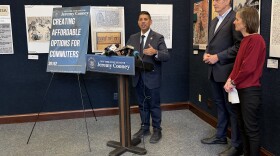Gov. Kathy Hochul’s administration is telling agencies to hold the line on spending, a sign of a tough budget cycle as the Democratic governor runs for reelection.
The warning came in a Thursday letter from Budget Director Blake Washington. The state already faces a projected deficit of more than $10 billion — with the prospect of wider gaps caused by federal cuts and funding freezes. The governor will present a budget in January.
“Unfortunately, federal assistance crucial for programs supporting New York’s most vulnerable have been curtailed, foisting new costs upon New York state,” Washington wrote. “Due to imprudent federal policies, economic headwinds remain as labor markets are cooling and inflation remains elevated.”
Washington said in an interview last week that he is cautiously optimistic about the state’s economic outlook. But he acknowledged that the federal government is a big wild card. More than $90 billion of the state’s $254 billion in spending comes from federal funds.
Most of it is for the Medicaid program, which provides health insurance to low-income and disabled people. The massive tax and spending bill signed by President Donald Trump this summer will knock 1.5 million people off their state-backed health insurance and reduce hospital funding by an estimated $8 billion, according to Hochul’s administration. Washington estimates a $3 billion hit to the state’s Medicaid program in the coming fiscal year.
The budget has an April 1 deadline, but Hochul has let budget talks fritter beyond that for the last several years, using the time as leverage for unrelated policy items. The spending plan adopted in May this year included a ban on students using cellphones at schools as well as changes sought by prosecutors to pretrial evidence-sharing laws.
What the current budget didn’t do was take a tough line on spending, said Andrew Rein, president of the Citizens Budget Commission, a fiscal watchdog group. Rein’s group said the budget adopted in May increased operating spending by 12% — something that’s increasingly unaffordable.
“You should start now doing some of the stuff that the state should have been doing all along, in terms of restructuring its Medicaid program and making sure it targets education aid to those most needy,” Rein said.
Progressive groups say raising income taxes is the answer. Erica Vladimer, communications coordinator for the Invest in Our New York campaign, said taxing rich people is extremely popular in public opinion polls.
“Governor Hochul would do well to listen to the people she represents,” Vladimer said. “New Yorkers will stand behind her when she finally adjusts our tax system so it’s more equitable and we can bring in more revenue.”
Vladimer’s group said in a statement that holding spending flat would essentially amount to a reduction in services. Washington, in his letter, said state agencies have “an obligation to do more with less.” He also asked agencies to look for ways to reduce the regulatory burden on people and businesses.
Hochul has pushed aside attempts to raise income taxes since she took office in 2021, and said last month that she is a “staunch capitalist” who doesn’t want to drive away wealthy New Yorkers. State data shows the top 1.5% of tax filers account for about a third of all income tax paid.
The governor may be under more pressure next year if Zohran Mamdani is elected mayor of New York City. The Democratic front-runner — whom Hochul endorsed — said he wants to fund expanded child care and free buses by raising taxes on the wealthy.
Washington, in his letter, reiterated that Hochul will hold the line.
“We must remain economically competitive with our neighboring states and improve economic opportunities for all,” he wrote.








